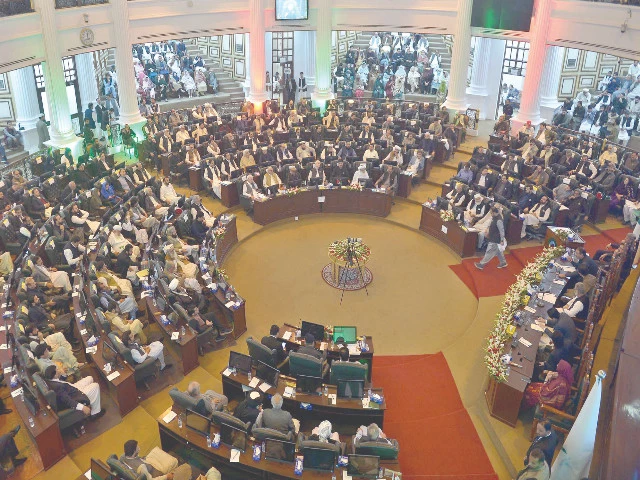Delegates attend a peace jirga convened by the Khyber-Pakhtunkhwa government in the provincial assembly in Peshawar. Photo: PPI
PESHAWAR:
Khyber Pakhtunkhwa’s political and civilian leadership on Wednesday called for a non-political, united approach to tackle terrorism and secure the province’s constitutional and fiscal rights as a multi-party peace jirga met in Peshawar to map out a common strategy.
In a rare show of unity, leaders from across the political spectrum called for an inclusive and permanent counterterrorism policy that transcends party lines and prioritizes the province’s security and rights.
The peace jirga strongly condemned terrorism and called for a comprehensive strategy to restore peace in the province.
In a joint statement, the jirga urged the KP government to take the provincial assembly into confidence on counter-terrorism measures and to assign internal and security responsibilities to the police and the Counter-Terrorism Department.
The jirga also recommended removing unnecessary security checkpoints and curbing illegal transportation of minerals from the province and other conflict-affected areas.
It further called for reopening Pakistan-Afghanistan trade routes, formulating the Pak-Afghan foreign policy in consultation with the KP government and preparing a new National Action Plan (NAP) in coordination with the provincial government and the assembly.
Addressing the provincial assembly jirga, Chief Minister Suhail Khan Afridi said the cost of two decades of militancy can be counted in lives and casualties, adding that the time has come to rise above party differences and adopt a single, long-term policy.
He urged the federal government to adopt a new approach to counter-terrorism involving all stakeholders in decision-making. “I expect that a durable and permanent solution will be found to this menace of terrorism which has been gnawing at Khyber Pakhtunkhwa for more than 20 years,” he said.
Afridi stressed that the era of “closed door decisions” must end. “We need to get out of the closed spaces, consider other individuals as intelligent, consider politicians as wise.”
He warned against short-term fixes and insisted on a “once and for all” policy to eradicate terrorism from the province.
Afridi warned that bombs do not check voters’ party cards and stressed that sustainable peace was possible only after the elimination of terrorism.
Appealing to all political parties to stand together for the rights of the province, he said that KP’s rightful share under NFC comes to Rs6.14 billion and, after including the newly merged tribal districts, a share of 19 percent.
However, he lamented that the province did not receive its due. Afridi added that the NFC stake amounts to Rs400 billion and claimed that the federal government owes KP Rs200 billion in net hydel profits.
He protested the “stepmother” treatment of the province, adding that short-term fixes must give way to a “once and for all” policy.
On Afghanistan, Afridi welcomed the talks and called for war to remain a last resort, noting that Pakistan and Afghanistan share many values and that a peaceful Afghanistan was essential for regional connectivity, peace and prosperity.
Governor Faisal Karim Kundi, who also addressed the jirga and sat with the chief minister, endorsed the call for collective action.
“If we don’t sit together, there will be no solution,” he said.
He congratulated the speaker for bringing all stakeholders under one roof and urged him to form a multi-party committee to ensure that the recommendations of the jirga continue to be followed.
Kundi emphasized that the province’s future should take precedence over political rivalries. “Every few years a superpower comes and tries to conquer Afghanistan, and when it leaves after failing, it leaves behind its dirt in the form of weapons that are used against us,” he said.
He warned that terroirsts were now equipped with advanced weapons such as thermal sniper rifles, adding that the province lacked the capacity to counter them alone. “We must put aside our politics and think about the prosperity of our province,” he urged.
Kundi called on provincial, federal and security institutions to meet to find durable solutions and recommended forming a committee with a representative from each party to take the province’s case forward.
Emphasizing the need to channelize youth in the right direction, he said the provincial government would stand with the effort to ensure KP’s rightful share.
Former National Assembly Speaker Asad Qaiser echoed Afridi’s call for unity and diplomacy, saying Pakistan must engage Kabul through dialogue.
“Pakistan and Afghanistan cannot survive without each other,” he said. “There will be peace in Pakistan only when there is peace in Afghanistan.”
PML-N’s Ibadullah Khan, the Leader of Opposition in the KP Assembly, noted that the jirga was being held in the provincial legislature for the first time. “We have put aside a myriad of differences and are sitting with the PTI,” he said, calling terrorism the province’s “number one problem”.
Meanwhile, ANP’s Mian Iftikhar Hussain rejected any distinction between “good” and “bad” Taliban, adding that only full implementation of the National Action Plan could restore peace.
“The government must own this problem,” he said. “ANP bravely faced militancy. We spoke, we fought and we rehabilitated the displaced.”
Former chief minister Mehmood Khan, who now leads PTI parliamentarians, questioned the fate of past peace jirgas. “You are the government. People gave you the mandate. You have to sit with the key stakeholders and form a jirga to talk to the federal government,” he said.
Other participants included JI leaders Sirajul Haq, Prof Mohammad Ibrahim, PPP’s Akhunzada Chattan, JUI-F Senators Maulana Attaur Rehman and Maulana Attaul Haq Dervesh and representatives of Pakhtunkhwa Milli Awami Party and Pakistan Mazdoor Kisan Party.
The jirga opened with prayers for victims of terrorism across the province.



